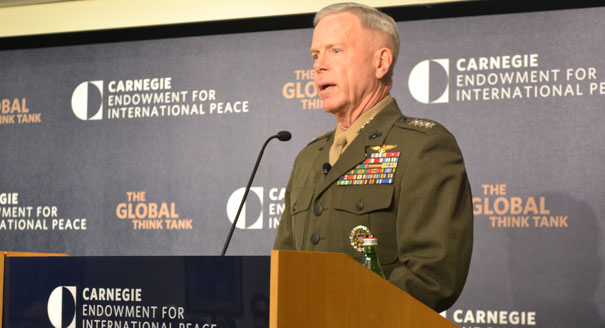Registration
You will receive an email confirming your registration.
With counterinsurgency efforts in Iraq and Afghanistan drawing to a close, the U.S. military is facing an abrupt transition. An evolving threat environment, budget cuts, and new policy preferences challenge the creative capacities of strategic planners and decisionmakers.
General James F. Amos, 35th commandant of the U.S. Marine Corps, discussed America’s future security challenges, and how the nation and its military might best prioritize its missions and capacities. General Amos outlined his vision of the post-2014 security environment, consider how to extract, preserve, and apply what has been learned in Iraq and Afghanistan, and discuss the renewed emphasis on the Asia-Pacific region. Carnegie’s Sarah Chayes moderated.
General James F. Amos
General James F. Amos assumed the duties of Commandant of the Marine Corps on October 22, 2010. General Amos’ command tours have included: Marine Aircraft Group 31 from 1996-1998; 3rd Marine Aircraft Wing in combat during Operations IRAQI FREEDOM I and II from 2002-2004; II Marine Expeditionary Force from 2004-2006; and Commanding General, Marine Corps Combat Development Command and Deputy Commandant, Combat Development and Integration from 2006 to 2008. Transferred in 2000 to the Pentagon, he was assigned as Assistant Deputy Commandant for Aviation. Reassigned in December 2001, General Amos served as the Assistant Deputy Commandant for Plans, Policies and Operations, Headquarters, Marine Corps. From 2008-2010 General Amos served as the 31st Assistant Commandant of the Marine Corps.
Sarah Chayes
Sarah Chayes is a senior associate in the Democracy and Rule of Law Program and the South Asia Program at the Carnegie Endowment. Formerly special adviser to the chairman of the Joint Chiefs of Staff, she is an expert in South Asia policy, kleptocracy and anticorruption, and civil-military relations. She is working on correlations between acute public corruption and the rise of militant extremism. Chayes is author of The Punishment of Virtue: Inside Afghanistan After the Taliban (Penguin Press HC, 2006). She is a contributing writer for the Los Angeles Times opinion section, and her articles have appeared in the Washington Post, the New York Times, and the Atlantic, among other publications.
